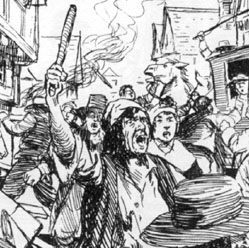
Mass action by the London populace posed a threat to the patriciate, risking a breakdown of law and order and the intervention of royal authorities to restore it (which often entailed seizure of the liberties and suspension of local self-government). An aroused mob was particularly dangerous when used in a relatively directed fashion, by radicals seeking to gain power. No wonder then, that the London rulers sought to sideline the folkmoot and acquiesced in its eventual suppression, and that they aimed at restricting popular participation in assemblies and elections.
A late thirteenth century chronicler based in London – perhaps
himself an alderman – included in his compilation several
colourful and coloured accounts of occasions when the lesser citizenry
was stirred to action. One may be found on this Web site under the
title "A disputed election". Another describes events in the aftermath
of the battle of Evesham; the party in London that had supported
de Montfort, led by mayor Thomas fitz Thomas and a few other patricians
and basing its power on support by the populace, threw itself on the
king's mercy and was sent off to prison. After a period of indulging
retribution, the king gave permission (1266) for the citizens to elect
one officer to act as the king's warden and see to the duties of
the shrievalty, so long as the person chosen had not been a Montfortian.
Following a week of popular demonstrations in protest of this restriction,
William fitz Richard was elected to the post, but
many of the common people, on the day that the aforesaid election took
place, gainsayed the same, crying– "Nay, nay," and saying,– "We
will have no one for Mayor, save only Thomas Fitz-Thomas, and we desire
that he be released from prison, as well as his companions, who are at
Windleshores." Such base exclamations did the fools of the vulgar classes
give utterance to, on the previous Monday, in the same Guildhall. Wherefore
his lordship the King, on hearing rumours to this effect, fearing an
insurrection of the populace against the principal men of the City, who
maintained their fealty towards him, sent to London Sir Roger de Leiburne;
who, on the Saturday next ensuing, came into the Guildhall with a great
retinue of knights and serjeants, with arms beneath their clothes; whither
a countless multitude of the City had already resorted, and that without
summons. And the same Sir Roger gave orders, on behalf of his lordship the
King, that all who were suspected, should be seized and put in arrest, lest
they might enter into some confederacy with the enemies of his lordship
the King. Wherefore on the same day there were taken more than twenty
persons, no one of the populace making any opposition thereto.
[H.T. Riley, ed. Chronicles of the Mayors
and Sheriffs of London, London, 1863, p.91]
Another riot was described as having taken place in November the
following year, in the context of a revival of the remnants of the
Montfortian party, under the earl of Gloucester, whose entry into
the city was the signal for a popular uprising that briefly overthrew
the government of the loyalist patricians. But this gave scope to
older rivalries within the community, for:
a dispute arose between certain of the craft of the goldsmiths and certain
of the craft of the tailors; to whom adhered, on the one side and the
other, some of the trade of the parmenters and some of the tawyers; which
persons held great assemblages, and for three nights together went armed
through the streets of the City, creating most severe conflicts among
themselves. Hence, without doubt, as was said, more than five hundred
of these mischievous persons were collected together at night, and in the
affray many of them were wounded; but still, no one would act a part that
belongs only to the Bailiffs. For every one was waiting by force of arms
to take vengeance on his adversary.... The Bailiffs and discreet men of the
City understanding which, had more than thirty of them seized and imprisoned
in Neugate; and [... the king's justice] took proceedings against them in
the King's behalf, saying that they, against the peace and their fealty to
his lordship the king, had gone armed in the City, and had at night
wickedly and feloniously wounded some persons, and had slain others, who
bodies, it was said, had been thrown into the Thames.
[Ibid,, p.104]
The royal justice tried to discourage further disturbances by making an example, hanging thirteen of the accused, and imprisoning three dozen others.